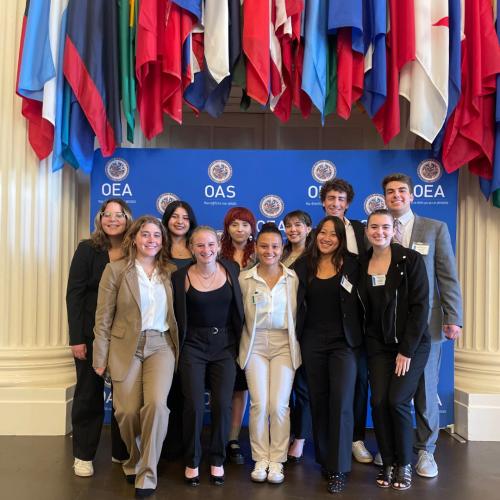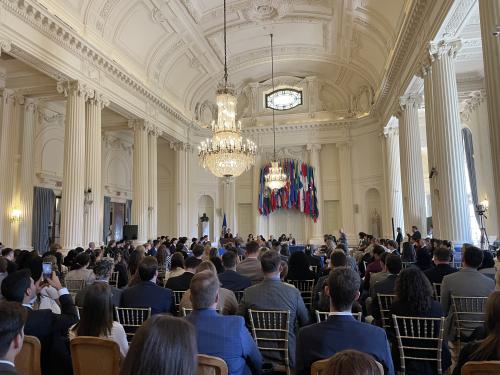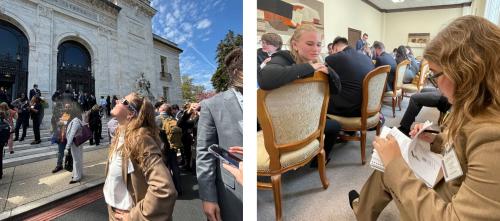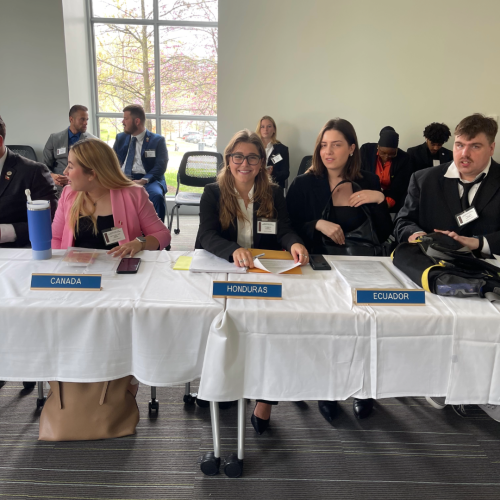Representing Honduras: Ava Gutierrez Shares Her Experience at the Washington Model OAS

Eleven Tulane students traveled to Washington, D.C., for the Washington Model OAS in April. This unique opportunity allowed college students to experience how the Organization of the American States General Assembly works. Each participating delegation represented a different country, and this time, we were assigned to Honduras. Kaitlyn Crowley and Ava Gutierrez wrote about their experiences. Find Ava’s chronicle below and read Kaitlyn’s reflection here.
Written by Ava Gutierrez
Earlier this April I had the opportunity to participate in the Washington Model of the Organization of American States (WMOAS) conference in Washington D.C. My name is Ava Gutierrez, and I am a second year at Tulane University studying Finance (major), Latin American Studies (major), and Spanish (minor) in the Altman Program of International Studies and Business. I am passionate about a career in accounting, as I am on track to completing the joint BSM- MACCT 4+1 program, but thanks to the Stone Center of Latin American Studies I have been fortunate enough to explore opportunities and resources that have enhanced my education and broadened my perception of what a global education looks like, specifically the WMOAS conference.
The Organization of American States (OAS) is the premier political forum for political discussion, policy analysis, and decision-making in Western Hemisphere affairs. Headquartered in Washington D.C., the OAS serves as a "multilateral regional body focused on human rights, electoral oversight, social and economic development, and security in the Western Hemisphere", according to the Council on Foreign Affairs. As of November 2023, thirty-two states in the Americas are members.
The annual Washington Model General Assembly of the Organization of American States is a five-day simulation of the OAS General Assembly that is dedicated to the immersive learning experience of OAS procedures and structures, in-depth learning of complex issues facing current foreign affairs, and the mastery of diplomacy. The experience offers students a unique hands-on opportunity to learn about the OAS, hear from Ambassadors and the OAS Secretary General, and partake in nuanced diplomatic discussions.
Tulane University has not had a delegation partake in the model in over ten years, but thanks to Dr. Jimmy Huck, the Professor and advisor for the Model OAS class, Tulane returned to the 2024 WMOAS representing Honduras. Including myself we had eleven delegates in the Model OAS class. Led by Professor Huck and our Head Delegate Mitchell Spector (Class of ‘26), we were divided into five committees: General, Juridical and Political Affairs, Security, Integral Development, and Special. In preparation for the model, all delegates researched Honduran history, politics, and contemporary issues and each committee selected material and led class discussions on their varying topics. This groundwork was preparation for each committee to write a formal draft resolution (PDR), a written document that addresses issues and proposes solutions. PDRs are specific to each committee and are the core of discussion and debate in the model. The class itself was student-led, discussion-based, and extremely collaborative. I served as a delegate on the Second Committee of Security along with Kaitlyn Crowley (Class of ’27) and our PDR was titled “Addressing Homicide Rates as a Result of Illicit Firearms Trafficking”. The weeks leading up to the model were exciting yet nerve-racking as we prepared to participate in the conference as WMOAS “newbies”.
The week came and the delegation from Tulane packed up and headed to MSY. We landed in D.C., the cherry blossoms were in bloom, and we were all looking forward, yet slightly nervous for what the week had to come. The Model commenced at the OAS headquarters where all delegations came together to hear from the OAS Secretary General, who reminded us about the importance of authenticity, and from then the President of the WMOAS officially opened the Model. That day happened to be the solar eclipse so, just as everyone else in the country were viewing the astronomical phenomenon, all delegates rushed outside as faculty and staff passed out eclipse glasses. Kaitlyn and I decided to use this friendly time, facilitated by “oos” and “ahhs” of the eclipse, to ask for signatures and support on our PDR (all PDRs require five co-signatures to be included in the agenda). D.C. returned to full sunlight, and we headed into our first committee meeting where we set the agenda for the week.
The following days of the model were hosted at Trinity Washington University. With bright and early start times of 9 a.m., the Tulane delegation was promptly commuting on the metro (a personal favorite experience of mine) at 8:20 a.m. sharp. Once we started to delve into the PDR debates, the committee sessions were lively. Kaitlyn and I would take turns sitting at the round table, confidently raising the placard for motions, objections, questions, and the occasional “motion to adjourn for lunch”. I learned so much from the model, and it was an extremely interesting experience because I was learning primarily from my peers and fellow delegates. My favorite part of the model was being able to meet students from other schools and partake in this sort of code-switching from respectable and inquisitive diplomats to fun-loving college students.
My time at the model was time well spent and I would do it all over again. I would encourage any student with an interest in diplomacy, foreign relations, public speaking, history, or just generalized curiosity to apply to be on the Tulane delegation. The team-style class structure is extremely unique and offers students a change of pace and learning style from traditional courses. The Model itself is a wonderful experience, but I will credit Professor Huck and my fellow delegates for the fulfillment the class brought me. It is not every day that you can be in a diplomatic simulation, however, it is every day that you can use the skills learned in the model to enhance and promote diplomacy, respect, and authenticity in our ever-changing world.




